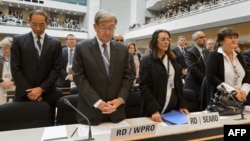The World Health Organization is planning to create a new program that can respond quickly to emergencies such as Ebola.
WHO Director-General Margaret Chan, unveiled this new proposal at the opening of the annual 194-member World Health Assembly, the organization’s highest decision-making body.
Dr. Margaret Chan was clearly stung by criticisms directed at her and the organization she leads for their performance in responding to the world’s largest and deadliest Ebola epidemic in West Africa.
“The buck stops with me," she said. "As a responsible leader, you need to learn the lesson and make the right changes ... I am committed to build an organization that has the culture, the systems, and the resources to lead the response to outbreaks and other health emergencies.”
Chan acknowledged that WHO was not up to the task and did not act quickly enough to the Ebola epidemic. The WHO chief did not declare Ebola a public health emergency until August 2014, six months after the virus was discovered in Guinea and nine months after the first case in December.
By then, Ebola had become an epidemic in Liberia, Sierra Leone and Guinea, having claimed 932 lives. The total number of dead now stands at more than 11,000.
Chan said the new program is designed for speed, flexibility, and rapid impact. She says it will work in partnership with key U.N. and International agencies and will be accountable to her. She said WHO will set up a $100 million contingency fund to finance the program, if the World Health Assembly approves it.
“I do not as director general of WHO ever again want to see this organization [faced] with a situation that it is not prepared and not staffed and not funded to do the job," she said. "We will move forward on an urgent footing. As I explained, I plan to complete these changes by the end of the year.”
Chan also told the Health Assembly she sees the development of new antibiotics to combat anti-microbial resistance as another key priority.
She warned that everybody is vulnerable to anti-microbial resistance, something that already is occurring in HIV, tuberculosis, gonorrhea and typhoid. She said she will urge the World Health Assembly to approve an action plan to tackle this critical issue.
She said she also will move to get the Assembly on board with the need to make health systems in developing countries strong and resilient enough to withstand shocks that come from climate change, pathogens or an overload of diseases, such as diabetes and cancer.
The World Health Organization, added Chan, will continue to provide urgent assistance to people caught in the devastating earthquake in Nepal and those victimized by conflict in Central African Republic, Iraq, Syria, and Yemen.











